|
Click pictures for a larger version.
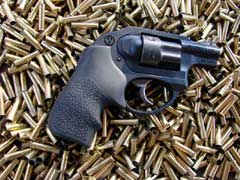
LCR 22 Magnum sitting atop the first 1150 empty cases
fired.
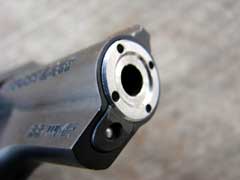
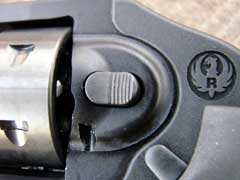

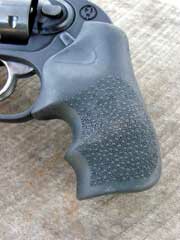
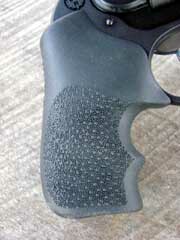
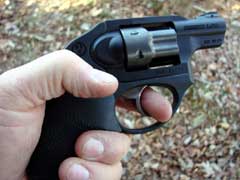
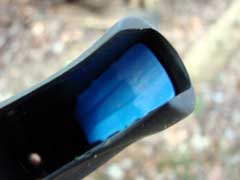
Hogue textured synthetic rubber grip is very
comfortable.
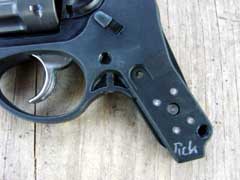
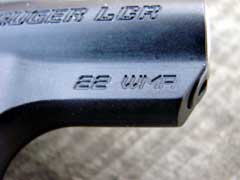
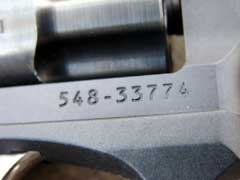
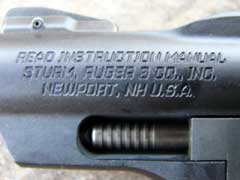
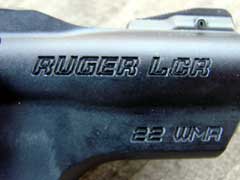
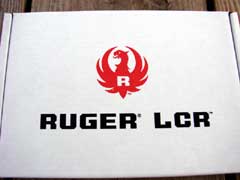
|
|
For the past month, riding in my left-hand
front pocket every day, has been the newest version of Ruger’s
polymer/aluminum/steel lightweight revolver; the LCR 22 WMR.
Weighing in at about fourteen and three-quarters ounces, the
short-barreled sixgun has ridden very comfortably there
everywhere that I have been. Each day, I have taken it out and
fired it, to assure myself and you readers that this little
jewel will perform when needed. For many, there is still no more
reliable nor simpler defensive handgun than a double-action
revolver, and they present a good argument in its favor. A
double-action revolver is easy to load, unload, and operate. It
is a point-and-shoot proposition, and as a carry gun, as
reliable as you can get.
There are not many professionals who will
argue against the revolver as a defensive carry gun. The
controversy and debate comes in when the subject of the
cartridge for which the weapon is chambered is brought into the
discussion. Everything being equal, bigger is better. A fifty
caliber hole is better than a thirty caliber hole. We can all
agree upon that. However, things are not always so simple, as is
the case of choosing a defensive handgun. A handgun carried
concealed is a compromise. In choosing, we must consider the
factors of size, weight, power, cost, ease-of-operation,
reliability, and finally, our own ability. Given a choice in a
bad situation, I would prefer to have a rifle, shotgun, or
Marine regiment at my disposal, but I cannot carry any of those
with me on a daily basis, so I must choose a handgun which I can
conceal comfortably. We each have to make that decision, to best
suit our own situation. Those who are new to carrying a
concealed weapon usually choose something at first that is
larger than they ultimately end up carrying. There was a time in
my life in which I carried twin
Glock 19 9mm pistols in a double Galco Miami Classic shoulder
rig. However, I now always have a gun in my left front
pocket, even when I am carrying something larger in a belt
holster. I gave up on the shoulder rig for every day carry years
ago, as it tends to get in my way now, doing what I do on a
daily basis.
In the end, most people end up carrying a
small semi-auto or revolver as a daily carry gun. We need
something that can ALWAYS be within reach, and a pocket gun
fills that role nicely. Whenever I feel the need, such as when
traveling, working cattle, or going into a large city, I carry a
full-sized sidearm also, but the pocket gun usually is the only
firearm that is always with me. I think that many other folks do
the same.
Caliber selection is, again, a compromise,
and for many folks, recoil is a deciding factor. There are some
who, for whatever reason, just cannot handle the recoil of a
center fire lightweight revolver, and a 22 rimfire is a weapon
that is easy to shoot, and easy to shoot well. A revolver that
is chambered for the 22 Long Rifle cartridge, in the hands of
someone that knows how to run it, can be an effective defensive
weapon. Even better is the 22 magnum. The magnum does not have
much more recoil than does the 22 Long Rifle, but offers a
bullet that is traveling faster, and is made to penetrate
deeper. Most 22 magnum bullets are of jacketed-lead
construction, and hold up well upon impact, penetrating as
deeply as a 38 Special Plus P hollowpoint from an equal-length
barrel. Penetration is very important, and getting the bullet
into the vitals is the goal.
When I first saw a prototype of the Ruger LCR
38 Special at the New Hampshire factory a couple of years ago, I
was thinking “22 magnum”. I don’t know exactly why, but I
harbor an unnatural affection for the 22 magnum cartridge; the
little thing performs all out of proportion to its diminutive
size. Recoil is light enough that anyone who can operate a
firearm can handle it, learning to place the bullets right where
they need to go, and allowing fast follow-up shots upon the
target. I am glad that Ruger is including the 22 magnum along
with the 22 LR, 38
Special Plus P, and 357 magnum
chamberings in this handy little revolver.
Specifications for the 22 magnum LCR are
listed in the chart below. Weight is listed in ounces. Trigger
pull is listed as pounds of resistance. Linear measurements are
listed in inches. The cylinder length does not include the
cylinder ratchet. Height includes the sights. The double-action
pull was very smooth.
| Overall Length |
6.5 Inches |
| Overall Height |
4.48 Inches |
| Weight Unloaded |
14.8 Ounces |
| Barrel Length |
1.903 Inches |
| Cylinder Length |
1.556 Inches |
| Cylinder Diameter |
1.28 Inches |
| Cylinder Capacity |
6 cartridges |
| Barrel/Cylinder Gap |
0.005 Inch |
| Trigger Pull DA |
8 Pounds, 14 Ounces |
I tested the LCR with nine
types of 22 Magnum ammunition for velocity and function. The
results with each brand and type of ammunition are listed in the
chart below. HP is a lead hollowpoint bullet. Solid is a lead
roundnose bullet. Velocity readings were taken at an elevation
of 541 feet above sea level, with an air temperature of
twenty-seven degrees Fahrenheit, with humidity in the
eighty-five percent range. Velocities are listed in
feet-per-second (FPS), and were recorded ten feet from the
muzzle of the revolver. Bullet weights are listed in grains.
| Ammunition |
Bullet Weight |
Velocity |
| PMC Predator JHP |
40 |
1077 |
| Winchester Dynapoint |
45 |
1006 |
| CCI TNT JHP |
30 |
1251 |
| Winchester Supreme JHP |
30 |
1253 |
| Winchester Supreme JHP |
34 |
1197 |
| CCI +V JHP |
30 |
1186 |
| CCI Maxi-Mag JHP |
40 |
1045 |
| Armscor JHP |
40 |
1102 |
| Winchester Supreme JHP |
28 |
1376 |
Initial function testing of the LCR 22 magnum
consisted of firing 1150 rounds of various types of 22 magnum
ammunition, including, but not limited to, each of the types
listed above, to check for any firing or extraction problems. In
addition to those listed in the velocity chart, I fired two
different types of Hornady ammunition and one of Remington. Only
one cartridge case out of those 1150 rounds showed any signs of
sticky extraction. That single case had split lengthwise,
causing hard extraction. That was no fault of the revolver, but
a defective cartridge. Every other cartridge fired and extracted
without a problem. I fired that amount of ammunition within
about three hours, as I wanted to be sure that extraction was
not going to be a problem with this 22 magnum revolver, as the
22 magnum cartridges does sometimes exhibit stubborn extraction
in some revolvers. The little Ruger performed like a champ, even
though no attempt was made to clean, cool, nor to lubricate the
weapon at all.
I also fired the 22 magnum LCR offhand at
targets at distances from seven to one-hundred yards. The little
Ruger grouped well, and right on with the sights using 40 grain
ammunition out to twenty-five yards. Keeping all hits within the
kill zone of a standard human silhouette target at twenty-five
yards was easy firing slowly, and rapid fire at ten yards was
just as rewarding. For low-light use, I installed the set of
Crimson Trace Lasergrips off of my LCR 38 Special, which fit the
22 magnum perfectly. I checked the 22 magnum ammunition for
penetration in ballistic gelatin, and all of the 40 grain
ammunition penetrated between thirteen and fifteen inches, as
did the 45 grain DynaPoint. Perfect. The CCI TNT penetrated the
least, only going about five and one-half inches, but showed
good expansion. For defensive use, I would stick with 40 grain
hollowpoint PMC Predator, Armscor, CCI, or the 45 grain
Winchester DynaPoint.
Many 22 rimfire revolvers have excessively
heavy trigger pulls. The Ruger does not. The pull weight
measured just under nine pounds on my LCR 22 magnum, but the
nature of the trigger pull, being very smooth and progressive,
makes it easy to operate. I think that Ruger set the pull weight
about as light as could be done with this revolver, and still
get one-hundred-percent reliable ignition.
For defensive use, the LCR 22 magnum is sized
just right. Hopefully, this will just be the first of the 22
magnum LCR revolvers from Ruger. This is just speculation on my
part, or maybe wishful thinking, but a trail version of this LCR
22 magnum with an adjustable rear sight and a three and one-half
inch barrel would be ideal for hiking or just bumming around in
the woods, but for now, I can live just fine with this first
version of the LCR 22 magnum, and I am glad to see Ruger add
this chambering to their dandy little polymer revolver line.
The Ruger LCR 22 magnum fills a niche that
needed filling, and is a good choice for someone needing a
compact, reliable, accurate, and lightweight defensive revolver
that has light recoil and is easy to operate. Like all Ruger
firearms, the 22 magnum LCR is made in the USA. I highly
recommend it.
Check out the LCR 22 online at www.ruger.com.
For the location of a Ruger dealer near you,
click on the DEALER LOCATOR at www.lipseys.com.
To order the LCR 22 magnum online, go to www.galleryofguns.com.
For quality 22 magnum ammunition, go to www.luckygunner.com.
Jeff Quinn
  
Got something to say about this article?
Want to agree (or disagree) with it? Click the following link to
go to the GUNBlast Feedback Page.
|
|
Click pictures for a larger version.
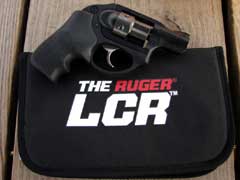
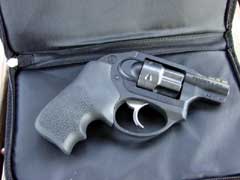
LCR comes with soft, zippered case.
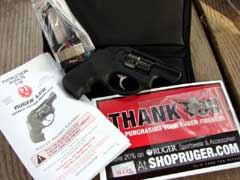
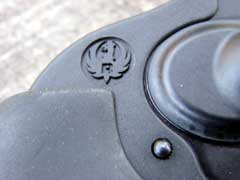
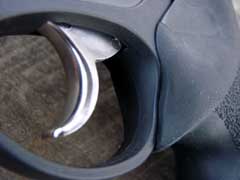
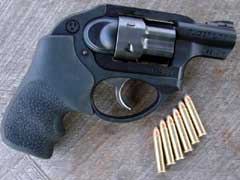
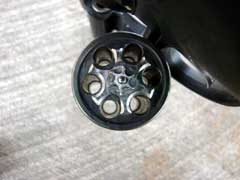
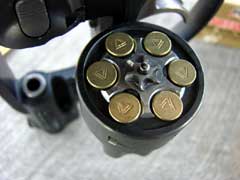
Six shots of 22 Magnum.
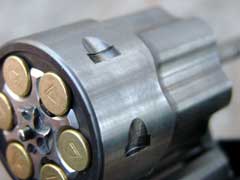
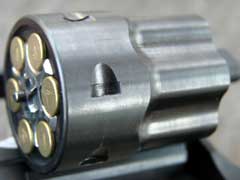
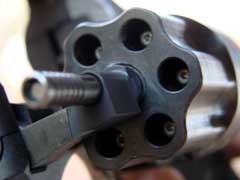
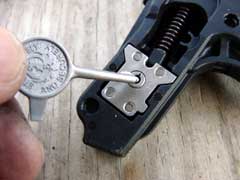
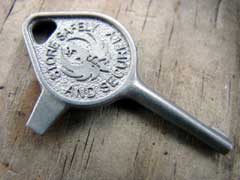
Internal key lock is there if you choose to use it.
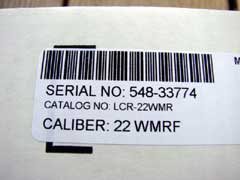
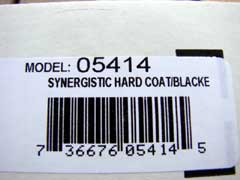
|
![]()